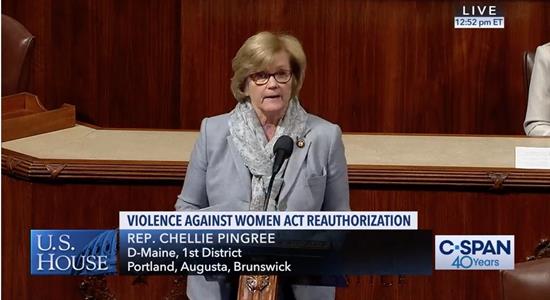Press Releases
VIDEO: On House Floor, Pingree Urges Maine Tribe’s Inclusion into 2019 Violence Against Women Reauthorization Act
Washington,
April 3, 2019
WASHINGTON, D.C. – Congresswoman Chellie Pingree (D-Maine) today spoke on the U.S. House floor in support of H.R. 1585, the Violence Against Women Reauthorization Act (VAWA) of 2019. This overdue VAWA reauthorization will ensure that the successful programs from the 1994 law continue and are strengthened. Pingree has worked to include language in H.R. 1585, aka VAWA, that will expressly ensure Maine and Alaska’s tribal communities are protected under the jurisdictional provisions of VAWA, like all other nationally recognized tribes. The House is expected to vote on passage of the bill tomorrow. WATCH PINGREE’S FLOOR REMARKS HERE.Below is a text of her floor remarks: I want to thank the Chair of the Judiciary Committee, and I want to commend the Chair of the Subcommittee on Crime for her leadership and quick action to get this reauthorized in the 116th Congress. I also want to thank the Chair of the Rules Committee for his effort to bring this bill to the floor today and have a strong debate. The Violence Against Women Act is a success story. Since its groundbreaking passage in 1994, this bill has been an example of Congress working in a bipartisan way to address an intolerable problem…the problem of domestic violence. Today we are here, over two decades later, making VAWA even better. HR 1585 will improve services for victims of domestic violence, dating violence, sexual assault and stalking…it assists young victims of violence and extends programs to address bullying. It also updates current programs relative to dating violence and children exposed to violent acts. Of particular importance in the state of Maine, the bill will further protect Native American women by expanding the provisions written in 2013. HR 1585 will include tribal jurisdiction over non-Indian perpetrators of dating violence, stalking, and trafficking . At last the Tribes of Maine and Alaska will have the same protections provided to Tribes nationwide. According to the most recent data from the National Institute of Justice, 4 in 5 American Indian and Alaska Native women have experienced violence in their lifetime. But according to the way the Maine Indian Claims Settlement act has been interpreted by some, Maine has been left out of the law. Unfortunately this has resulted in tribal victims of domestic violence in Maine or Alaska losing out on protections that have been extended to tribal victims of every federally recognized tribe in the country. The benefits that other Tribes have seen from allowing tribal jurisdiction over domestic violence cases include: increased public safety for all of those living on tribal lands, increased community conversations about domestic violence, updates to tribal criminal codes AND increased collaboration among tribes and local, state, governments…all of which have been elusive for the Tribes of Maine. Today’s bill will address this long overdue unfairness that has left Maine’s Tribes not only to b e treated differently, but has also left them out of the benefits of the 2013 VAWA bill. But for every Member of this body, there are many reasons to support this bill today. We need to act on this bill and we need our friends in the other body to quickly take up this legislation. A bill like VAWA cannot wait another week or month for reauthorization…its provisions have lapsed and we need to correct that now. I urge my colleagues to support it and I yield back. BACKGROUND: Today, the House began consideration of H.R. 1585, Violence Against Women Reauthorization Act of 2019. H.R. 1585 is a bipartisan, robust, long-term Violence Against Women Act reauthorization. The landmark Violence Against Women Act of 1994 ushered in transformative progress by calling for the protection of all Americans from violence and abuse, and working to ensure survivors had access to essential services and to justice. Every time Congress has reauthorized VAWA, they have strengthened it to improve protections and access to safety and justice for all survivors. Since 1994, the rate of domestic violence has declined by over 50 percent. However, the extent of domestic violence remains way too high. Experts estimate that one in three women in the U.S. still experience domestic violence. Like previous reauthorizations, H.R. 1585 makes vital improvements to address gaps in current law, based on extensive consultation with victim service providers, law enforcement, and other experts. ### |

